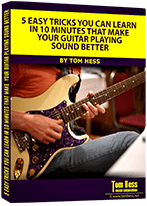Become A Better Guitarist By Bringing Your Musical Skills Into Balance
Learn In 10 Minutes

EMAIL TO GET ACCESS
By submitting your info, you agree to send it to Tom Hess Music Corporation who will process and use it according to their privacy policy.
Most guitarists are totally out of balance with their musical skills when they practice guitar.
Those of you who have read my other articles (about how to practice guitar) know that I am not a believer in studying all music related things, nor am I a believer in studying a billion different guitar playing styles and musical skills.
As a musician and composer, I am committed to the process of mastering only the skills I need to reach my goals (improve at guitar and become a better guitarist).
As a guitar teacher, I am committed to helping my students master whatever things are needed to reach his/her goals. (Mainly: to help them play guitar better.)
In almost every case, it is not important to learn everything about everything when you practice guitar.
It would be nice to do that when you practice guitar, but there is simply not enough hours in the day (or years in a life) to master all the musical skill that exist.
Learn In 10 Minutes

EMAIL TO GET ACCESS
By submitting your info, you agree to send it to Tom Hess Music Corporation who will process and use it according to their privacy policy.
A significant percentage of my guitar students had already been playing/studying music for a while before studying with me.
Often, they’ve studied with more than one previous guitar teacher in the past in the quest to improve their musical skills and play guitar better.
In almost every case, these students possess some promising skills in a few musical skills and are severely lacking in other, very important, areas. That is what has been stopping their efforts to play guitar better.
The problem is not that they are lacking in this area or that one, but that they are lacking in some musical skills that are often critical (or at least important) in achieving their own guitar playing goals.
The worst part is they often don't realize how much they are lacking in certain musical skills.
Nor do they fully understand just how much that weakness holds back their efforts to become a better guitarist.
It is, in my opinion, every guitar teacher's responsibility to stress this issue to his/her students and to work with the student on a regular basis to bridge the gap and improve these weak spots. That is how those students will learn to practice guitar the right way and begin to play guitar better.

For all you guitar players reading this, if you are already studying with a good guitar teacher (who is helping you to improve at guitar), make sure he/she understands what your biggest musical goals are.
If your guitar teacher is a good one, he/she should be working with you or bringing up your lagging musical skills.
And if your guitar teacher isn’t, can't or won't do that...
Realize that they won’t help you become a better guitarist. Find another teacher who is more qualified to help you improve your musical skills and become a better guitarist. (Download the FREE guide about How To Find And Choose A Guitar Teacher)
Of all common musical skills, the one many students are usually strongest is actually technique.
And the weakest musical skills are usually aural skills, songwriting and improvisation.
Let's talk about how to improve at each one, sarting with aural skills (ear training).
Here are some ways to train your ear most effectively as you practice guitar:
1. Transcribing (figuring out by ear) songs, chords, melodies, solos, etc. when you practice guitar.
Tip: try to use your guitar as little as possible when transcribing music. Of course, use it as much as necessary, but your ear will develop faster (allowing you to play guitar better) when you force it to identify the sounds you are hearing with minimum help from your guitar.
2. Sing scales (yes, out loud). As you practice guitar to improve your ear, start with singing the major scale. Later, add the natural minor scale, the melodic minor scale, harmonic minor scale, pentatonic scale, blues scale, chromatic scale, etc. the better your ear becomes at recognizing scales, the easier it is to become a better guitarist and play guitar better.
 Practice Less To Get More Results
Practice Less To Get More ResultsBecome highly effective with your guitar practicing time.
 Create A Guitar Practice Schedule
Create A Guitar Practice ScheduleLearn 8 steps to creating your own guitar practice schedule.
 Powerful Guitar Practicing Secrets
Powerful Guitar Practicing SecretsDownload a free 100+ page eBook
with guitar practice tips.
Tip: Practice ear training frequently throughout the day (even during the hours of the day when you don’t practice guitar), but for a few minutes at a time. This keeps ear training from becoming boring and you’re less likely to need a lot of willpower to do it.
And it gives you
The best times to practice ear training are: while driving and while taking a shower. Not only is this something you are likely to do every day (thus – making it more likely you’ll actually do it)...
But you will also be alone, so you can sing as loudly as you want without worrying that anyone hears you. This is a great way to “practice guitar” away from the guitar – improving your musical skills faster. That is how you become a better guitarist in less time than it takes most people.
3. Sing intervals (two notes at varying distances).
5. Sing chords one note at a time (this is called arpeggiating the chord). Begin with triads (major, minor, diminished and augmented) and move on to 7th chords and extended chords.
6. Transcribe music rhythms. This is exactly like transcribing a melody, but the focus here is on writing down on paper the rhythm only.
7. Imagine a 3 or 4 note melody in your mind and then try to play it on your guitar.
Question: “But Tom Hess, what if *all* I want to do is shred really fast? Should I still train my ear when I practice guitar?”
Answer: Yes. Believe it or not, ear training helps you fix the mistakes that happen near your top speeds (that you can only detect if you have a good ear).
This makes it far easier to refine your faster playing and make it cleaner, more consistent and more accurate.
So yes, training your ear helps you improve many musical skills. And yes, it’ll help you become a better guitarist when it comes to speed.
Here is an example of what I mean:
And use this idea when you practice guitar speed... and other musical skills. It’s a fantastic practice approach for learning to play guitar better.
Songwriting may or may not be a part of your goals.
That said, improvisation is probably going to be an important tool that you will need for your goals and certainly aural skills will definitely be a critical part of virtually all goals.
Being out of balance musically can be a real problem for two main reasons:
- Your weak areas will always hold you back because you won't be able to accomplish what you need to without being strong in all the areas required to reach your musical goals.
- Areas where one is strong in are not as useful without all the other skills needed to go along with it. This makes an area, which in general is pretty strong, now only mediocre because strong areas can't be fully applied.
Here is an example relating to the second point above: Let’s assume someone's main goal is to write great songs with great lead guitar parts. Let’s also assume the following:
| This Person’s Strong Areas Are: | This Person’s Weak Areas Are: |
|---|---|
| Lead Guitar Technique | Music Theory Knowledge |
| Good Vocabulary of Chords | Aural Skills (ear training) |
| Rhythm Guitar Playing | Improvising |
| Sense of Melody | Form (song structure) |
It is likely this guitar player will have no problem finding some nice sounding chords because he/she knows a good amount of chords.
BUT because of his/her lack of understanding in how chords work together (music theory weakness), it will be hard to consistently find good chord progressions (combinations of chords).
Plus, not understanding about theory will make it difficult to write music that is in key and that can change keys fluidly.
This guitar player's aural skills are weak too so "hearing" chord progression in his/her head won't be easy either.
So in the end, it won't matter much that this person knows a lot of chords because the weaknesses are severely restricting the ability to apply the chord knowledge.
Let’s say this guitar player gets a song written and now it’s time to record/play a guitar solo over the song.
He/she has good lead guitar technique and a good sense of melody.
That is a great start, but with weak improvising skills and a weak ear (aural skills), it will be very difficult to write something that actually sounds like it fits the song.
With a better knowledge of music theory, it is possible to at least partly bridge this gap. BUT in our example this person is weak in music theory.
So here is another classic example of how one's strong areas are not really valuable since they can't really be applied.
Sure this person could play some really fast guitar parts that has some melodic sense to it, but if it doesn't really fit the song, what good is it?
The examples I gave above are not exaggerations or extreme, they are just two, of many, very common situations that really hurt one's ability to reach goals and feel fulfilled from music.
Most players are way out of balance and are being held back on a daily basis.
Many people are seduced by their strengths and ignore their weaknesses, concentrating on making only the strong areas stronger.
All that does is make one even more out of balance, more musically frustrated and further away from personal musical bliss.

Use customized electric guitar lessons to master the skills necessary for reaching your guitar playing goals.
